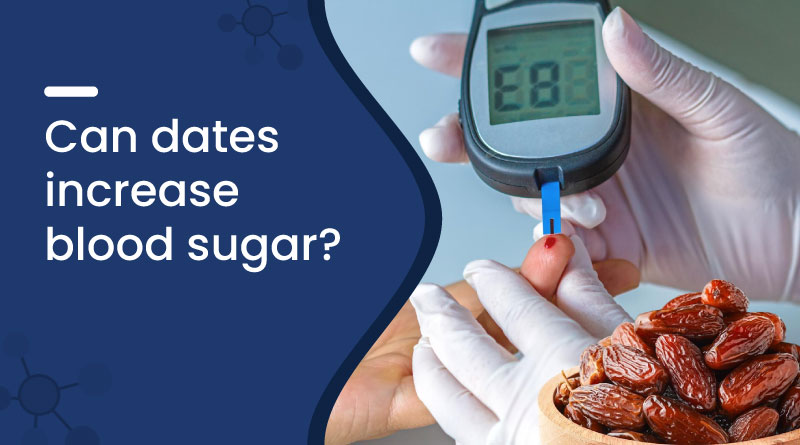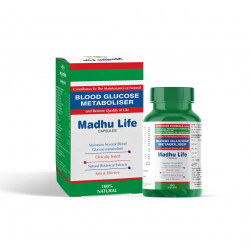Can Dates Increase Blood Sugar?


Dates are a naturally sweet fruit often enjoyed as a healthy snack or used in desserts. Full of vital nutrients and antioxidants, they support overall health in multiple ways. However, their high natural sugar content raises questions about whether they can increase blood sugar levels, especially for people with diabetes. This blog explores the nutritional profile of dates, their impact on blood sugar, and safe ways to include them in your diet.
Nutritional Benefits of Dates
Dates are the sweet fruit of the date palm tree, valued for both their flavor and long-standing health benefits. They are an excellent source of:
- Natural sugars (glucose, fructose, and sucrose)
- Dietary fiber
- Vitamins (B-complex vitamins, vitamin K)
- Minerals (potassium, magnesium, iron, calcium)
- Antioxidants that protect against inflammation and oxidative stress
Naturally sweet, dates are an energy-rich fruit that provides a quick and effective boost.
How Sweet Are Dates?
Dates are naturally high in sugar. A single Medjool date contains roughly 16 grams of sugar. This high sugar content means they can cause a spike in blood sugar if eaten in large quantities. However, their fiber content helps slow sugar absorption, making them a better alternative to refined sugar.
Do Dates Increase Blood Sugar Levels?
Yes, dates can increase blood sugar levels, but the extent depends on portion size, the type of date, and individual metabolism. For healthy individuals, moderate consumption is unlikely to cause harmful spikes. For people with diabetes, monitoring intake and pairing dates with other foods can help manage blood sugar effectively.
Can Diabetics Safely Eat Dates?
Yes, diabetic patients can enjoy dates in moderation without drastically affecting blood sugar. Key strategies include:
- Limit to 1–2 small dates per serving.
- Combine with yogurt, nuts, seeds, or other proteins and healthy fats to reduce the rate of sugar absorption.
- Opt for lower-GI varieties such as Deglet Noor.
- Spread consumption throughout the day rather than eating several at once.
- Incorporate dates as a natural sweetener in your smoothies or oatmeal.
- Monitor blood sugar to understand individual responses.
Diabetic patients need to choose foods that won’t trigger blood sugar spikes.
Health Benefits of Eating Dates in Moderation
- Sustained energy due to natural sugars and fiber
- Improved digestion from dietary fiber
- Rich source of essential minerals and antioxidants
- Supports heart health and bone strength
Portion control is key to enjoying these benefits without raising blood sugar excessively.
What Happens If a Diabetic Patient Eats Too Many Dates?
Overeating dates may result in quick rises in blood sugar levels because of their natural sugar concentration. This may cause:
- Hyperglycemia (high blood sugar levels)
- Increased insulin demand
- Fatigue or energy crashes
- Weight gain if consumed excessively over time
For diabetic patients, it’s crucial to stick to recommended portions (1–2 dates per serving) and pair them with fiber, protein, or healthy fats to minimize blood sugar fluctuations.
Alternative Options for Diabetics
Diabetic patients can enjoy natural sweetness without spiking blood sugar by choosing these options:
- Berries – Strawberries, blueberries, and raspberries are naturally low in sugar and loaded with antioxidants.
- Apple or Pear Slices – Provide fiber and natural sweetness.
- Unsweetened Dried Fruits – Apricots or figs in moderation.
- Nuts and Seeds – Almonds, walnuts, pistachios, and chia seeds provide healthy fats when added to your diet.
- Stevia or Monk Fruit – Natural sweeteners for recipes or drinks.
Conclusion
In conclusion, dates are a nutritious and naturally sweet fruit that can be enjoyed even by diabetic patients when consumed in moderation. By controlling portion size, pairing with protein or healthy fats, and choosing lower-GI varieties, dates can provide energy, fiber, and essential nutrients without causing significant blood sugar spikes.
Frequently Asked Questions (FAQs)
Q. Can eating dates raise blood sugar?
A. Yes, dates contain natural sugars that can raise blood sugar, especially in large amounts. Consuming in moderation and combining with protein, fiber, or healthy fats can help prevent blood sugar spikes and keep levels steady.
Q. How many dates are safe for diabetic patients?
A. Diabetic individuals can generally consume 1–2 small dates per serving. Spreading intake across the day and monitoring blood sugar ensures safe consumption without causing excessive glucose fluctuations.
Q. Can dates replace sugar in recipes?
A. Dates are a natural sweetener ideal for smoothies, oatmeal, or desserts. They provide energy, fiber, and nutrients, but should be used in moderation to avoid blood sugar spikes.
Q. Are dates too high in sugar?
A. Yes, dates are naturally high in sugar, with a single Medjool date containing about 16 grams. While nutritious, excessive consumption can raise blood sugar, so portion control is essential, especially for diabetics.
Q. How many dates can a normal person eat in a day?
A. Healthy individuals can usually enjoy 3–5 dates each day, either as a snack or added to food. Moderation is key to enjoying the benefits without excessive sugar intake.
Q. Should diabetics avoid dates?
A. Diabetics don’t need to completely avoid dates. Consuming 1–2 small dates in moderation, paired with protein or healthy fats, can provide nutrients and energy without causing significant blood sugar spikes.
Asana (Pterocarpus Marsupium) 70mg, Kara...









 Added!
Added!